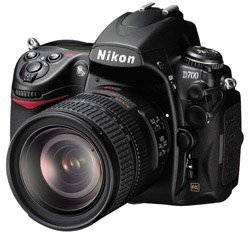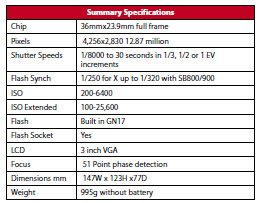articles/Cameras/bigchips-page1
Big Chips - small serving - part 1 of 1 2
by Mike McNamee Published

Mike McNamee gets a first look at the latest Nikon gear
You know when a camera-maker invites you down to London and asks for a non-disclosure about the fact that the meeting is even happening, that something big is likely to be going down. The discussion outside the theatre, before we were enlightened, centred on two possibilities, a large pixelcount D3x or a large chip Dxxx spaced between the D300 and the D3. I was in the former camp and, as usual, turned out to be wrong, I must spend more time on the web there were even pictures of the D700 there all along (well, since early June anyway, one printing company in China looks to be in big trouble over this!). Looking more or less like a D300, the D700 takes almost all of the technology of the D3 and puts it in a lighter, more compact frame. So there it is, a full FX frame, 12.1 megapixels, at just a couple of ounces more that the D300. This makes it just right as a backup for a D3 or as a lighter camera for a female shooter. The wedding pros have taken to the D200 and the D300, but adore the low-light performance of the D3, so there is no reason to suppose that the D700 will be in their sights for the next upgrade. The most important feature is the CMOS chip, is that the ground-breaking high ISO, low noise performance of the D3, has been built in. Interestingly the brochure highlights a few wedding shots including a double page spread, shot, seemingly, in candle-light at 3200 ISO. The focus system is also lifted from the D3 with its 51 point detector to go with both Live View and wireless facilities. Space for a second CompactFlash has been sacrificed, but the battery is quite leggy. You can expect 1,000 frames from the standard battery, rising to 2,900 with the optional 3-AA MB D10 pack. The installed battery incidentally is shared with the D300.

A boon for photographers who have to change lens is the Integrated Dust Reduction System. This sits in front of the chip and vibrates at four resonant frequencies to shake of any offending particles and, as a by-product, drops the view coverage to 5%. This is a small price to pay for the savings in clean-up time.
You are currently on page 1 Contact Mike McNamee
1st Published
last update 09/12/2022 14:51:38
More Cameras Articles
There are 0 days to get ready for The Society of Photographers Convention and Trade Show at The Novotel London West, Hammersmith ...
which starts on Wednesday 15th January 2025




